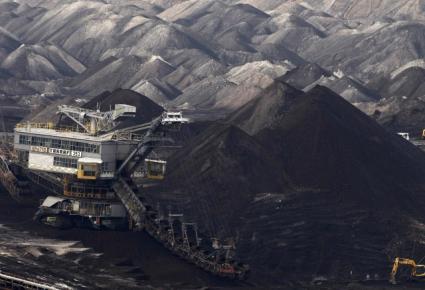India Coal Imports Aren't a Big Enough Boost: Russell
New rules may cut Indonesian exports by between 15-20 percent in October from September, according to the coal industry

New rules may cut Indonesian exports by between 15-20 percent in October from September, according to the coal industry
Bareksa.com - Australian coal miners desperate for good news got a double boost recently, but India's cancelling of private mining blocks and Indonesia's new export rules are a salve rather than a cure for the industry's woes.
An Indian court ruling scrapping the allocations of coal blocks to private operators will undoubtedly cut production and boost demand for imported fuel.
And it's also likely that new export permit rules being introduced by Indonesia will at least temporarily lower shipments from the world's largest exporter of thermal coal for use in power plants.
Promo Terbaru di Bareksa
Also, it remains the case that many Indian power stations are critically short of coal, given the long-standing inability of state producer Coal India and the railways to mine and transport adequate supplies.
All of this seems like manna from heaven for Australian coal miners, the majority of whom are unprofitable given the 25 percent decline this year in the benchmark Newcastle Port thermal coal price to $64.91 a tonne last week, a fresh five-year low.
But there are a few reasons to be sceptical as to whether this will be a significant boost for coal miners, or just a serendipitous lolly in a bowl of bile.
INDIA SHORTAGE WORSENING
India's top court scrapped 214 coal blocks allocated by the former government, ruling its processes were arbitrary and illegal.
The operating blocks among those, which were expected to produce an estimated 52 million tonnes in the current fiscal year, will be returned to Coal India by the end of March 2015.
However, it's likely that output from them will start to tail off prior to the handover, and that it won't be ramped up quickly by Coal India once it assumes control, given it will take time for the state behemoth to get to grips with the new assets.
All up, the coal shortage in India is likely to grow substantially, and may exceed even the top end of the government's estimate of between 185 million to 265 million tonnes by the 2016-17 fiscal year.
India imported 168.4 million tonnes in the fiscal year ended March 2014, and researchers OreTeam expect this to rise to 210 million in the year starting April 2015, while Fitch unit India Ratings & Research says imports may rise as far as 230 million.
The OreTeam forecast is a reasonable import demand assumption, and there is little doubt that India could use all 210 million tonnes of imports, and possibly even as much as the India Ratings estimate.
But the big question is whether the already strained port and rail infrastructure is ready to handle such an increase in volumes.
The Indian experience is generally that capacity increases are realised, but seldom in the time frames initially envisaged. There are also problems in getting projects coordinated, with the risk that a port may be ready to receive more cargoes but the rail not yet able to transport it.
India's imports surged 19 percent to 16 million tonnes in September, according to data from trader mjunction.
But even this jump in imports, if maintained, would result in annual imports of 192 million tonnes, which is higher than the 2013-14 outcome, but short of forecasts.
It may be more realistic that imports could struggle to rise in the coming fiscal year above 200 million tonnes.
That would still sound fairly good to coal miners, especially those outside Indonesia.
INDONESIA RULES A TEMPORARY SALVE
New rules may cut Indonesian exports by between 15 and 20 percent in October from September, according to the coal industry. The Southeast Asian nation shipped between 25 and 30 million tonnes in September, according to the Indonesian Coal Mining Association.
Indonesian miners are worried that the regulations, aimed at ensuring compliance with laws and taxes, will drive some struggling companies to the wall.
Notwithstanding the issues surrounding the new export permits, it's likely this will be only a temporary situation, meaning that the scope for rival miners in Australia, South Africa and even Colombia will be limited.
Coal from those suppliers is also more expensive to land in India than cargoes from Indonesia, meaning there may be some reluctance on the part of buyers to pay more that they are used to, even though prices are currently depressed.
Certainly, the coal futures market hasn't priced in rising prices further along the curve, suggesting that investors haven't yet bought into the idea of a demand-led revival.
Newcastle futures are in mild contango, but this has actually flattened slightly in the past month, and the same is true for Indonesian sub-bituminous futures.
Lastly, slowing demand for coal imports from China may counteract any increase in demand from India.
Even if the court decision in India and new rules in Indonesia do provide some relief to coal miners, the underlying problem of too much capacity chasing too little demand remains unresolved. (Source : Reuters)
Pilihan Investasi di Bareksa
Klik produk untuk lihat lebih detail.
| Produk Eksklusif | Harga/Unit | 1 Bulan | 6 Bulan | YTD | 1 Tahun | 3 Tahun | 5 Tahun |
|---|---|---|---|---|---|---|---|
Trimegah Dana Obligasi Nusantara autodebet | 1.201,44 | ||||||
STAR Stable Amanah Sukuk autodebet | 1.181,6 | - | - | ||||
Syailendra Sharia Fixed Income Fund Kelas A | 1.152,06 | - | - | ||||
Eastspring Syariah Mixed Asset Fund Kelas A | 1.047,01 | - | - | - | - | - |

Produk Belum Tersedia
Ayo daftar Bareksa SBN sekarang untuk bertransaksi ketika periode pembelian dibuka.

Produk Belum Tersedia
Ayo daftar Bareksa SBN sekarang untuk bertransaksi ketika periode pembelian dibuka.